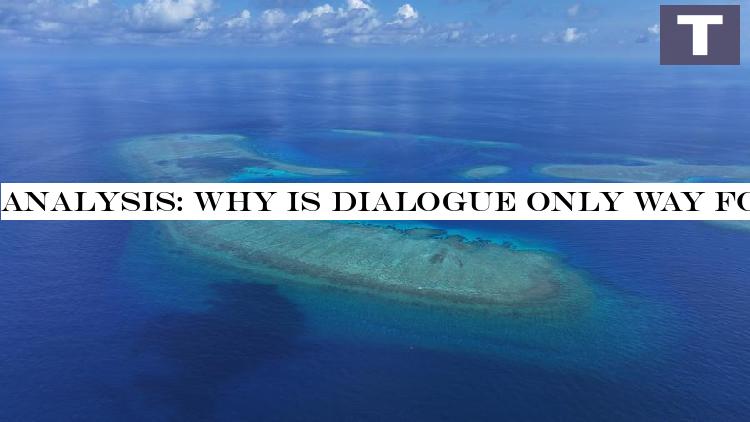
The damage of the "2016 Arbitral Award on the South China Sea" to regional peace and stability as well as the maritime order has become increasingly evident, said Chinese Foreign Minister Wang Yi on Saturday.Wang, also a member of the Political Bureau of the Communist Party of China Central Committee, made the remarks while speaking to reporters about the South China Sea issue on the sidelines of the annual meeting of the Association of Southeast Asian Nations (ASEAN) in Kuala Lumpur, Malaysia.His remarks coincided with the ninth anniversary of the "arbitral award," which China has repeatedly dismissed as "nothing but a piece of waste paper that is illegal, null and void, and non-binding."Without engaging in a thorough exchange of views with China, an essential prerequisite, the Philippines unilaterally initiated the "arbitration," thereby breaching the mutual understanding between the two countries to resolve disputes through peaceful consultation, the Chinese Foreign Ministry said in a statement on Saturday.'A typical troublemaker'Carlos Arguello Gomez, a member of the International Law Commission, said mutual consent is essential for resolving disputes."It is extremely important that both parties or the parties, whatever that are in dispute, should agree a mechanism to solve that dispute," Gomez told a recent program of China Media Group's (CMG) Voice of the South China Sea.There's an agreement that if they are only trying to force one of the parties to accept a mechanism for which they are not ready to do so, it would not lead to any real solution, he added.Wu Shicun, chairman of Huayang Center for Maritime Cooperation and Ocean Governance, said the "arbitral award" has been a typical troublemaker in the South China Sea."The South China Sea situation has become increasingly volatile today, driven not only by U.S.
factors, but also by the South China Sea arbitral award," Wu told CMG.Lei Xiaolu, a professor of the China Institute of Boundary and Ocean Studies at Wuhan University said the tribunal exceeded its legal authority by ruling on sovereignty issues."Clearly, the tribunal does not have jurisdiction over sovereignty disputes, but it ignored this fact, and forcibly exercised jurisdiction," said Lei.
"The manner in which the tribunal exercised its jurisdiction will negatively impact international rule of law," she added.Anthony Carty, a British scholar of international law, said the initiation of the "arbitration" was groundless."There's no reasonable ground for going to arbitration.
And this so called rule-based international law is agreed by most international lawyers to be just a lot of propaganda," said Carty.Zhou Jian, former representative for the Boundary and Ocean Affairs of China's Ministry of Foreign Affairs, said the ruling creates problems."The ruling itself is illegal.
It did not solve the problem, but created new problems and contradictions.
It hinders cooperation between the South China Sea countries," said Zhou.Herman Tiu Laurel, president of the Manila-based think tank Asian Century Philippines Strategic Studies Institute, said the "arbitration ruling" triggered "a myriad of problems" for the country, economically, diplomatically and regionally."I have articulated a myriad of problems created by the 2016 arbitration ruling, particularly the economic and diplomatic damage it has inflicted and continues to inflict on the Philippines," he said during a recent interview with Xinhua, stressing that regional peace and stability have been at risk due to the tensions caused by the so-called award.The arbitration ruling "has become the source of 'silent alienation' of the Philippines from its ASEAN family, being in conflict with China while all the rest, including those with South China Sea disputes, are in full cooperation mode with China," Laurel said.South China Sea peaceSpeaking to reporters on Saturday, the Chinese foreign minister said the South China Sea should not always be associated with friction, conflict, or confrontation, but with peace, stability, and cooperation.
He called on China and ASEAN to work toward this direction.Malou Tiquila, founder of PUBLiCAS Asia Inc, a think tank in the Philippines, stressed the importance of finding common ground between different sides."It is easier to settle problems if you look at each other as friends.
And to a certain degree, this is the Asian civilization," she told CMG.Ruhanas Harun, a professor of National Defense University of Malaysia, stressed the importance of negotiations in resolving disputes."All the countries, they all depend very much on the stability and peace in the South China Sea," said Harun.
"I think at the end of the day, negotiations, discussions would yield a better prospect and a better future for peace and stability in the South China Sea," she added.Rommel Banlaoi, president of the Philippine Society for International Security Studies, called on the Philippines to revive a collaborative approach to manage dispute with China."I think there is a need for the Philippines to recall the achievements of the bilateral consultative mechanism in the South China Sea, where both countries willingly decide to cooperate rather than compete in the South China Sea," Banlaoi told CMG.
"And I think that's the approach that we should be upholding."Read more:Explainer: Why China rejects the South China Sea arbitration awardExplainer: Why China's South China Sea claims are legitimate

 18
18







